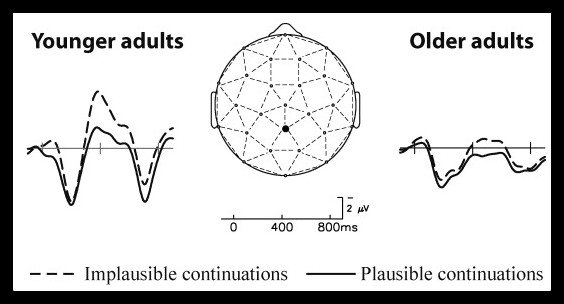Aging and Semantic Memory
Normal aging causes widespread changes in the brain, many of which could be expected to impact language functions. However, in the absence of disease (such as Alzheimer’s) or stroke, which can have serious consequences for language, it is generally found that older adults perform much like younger adults on language comprehension tasks, and, indeed, that vocabulary and other kinds of knowledge can increase throughout the life span. This similar level of performance, however, may come about through different underlying brain processes. For example, recordings of brain electrical activity have revealed changes in the pattern of N400 responses to words in simple contexts; the N400 is an event-related potential (ERP) component that has been linked to the processing of meaning. In particular, younger adults show facilitation (smaller N400s) for incongruent words that are related to an expected completion, suggesting that they are using sentence context to predict likely upcoming words. In contrast, older adults as a group elicit N400 responses that pattern primarily with plausibility (the fit of the word to the sentence), suggesting that they do not make predictions, but instead wait for the word and integrate it with the sentence context information. There is substantial variability among older adults, however, which is correlated with factors such as vocabulary and verbal fluency (ability to come up with words rapidly).
Our research program, which is funded by the National Institute on Aging, is designed to try to understand how language comprehension changes with age. In particular, we aim to uncover which aspects of language change most with normal aging (e.g., word or sentence processing), how individuals differ (and what predicts those differences), and how language and memory abilities are linked. We also examine the underlying brain mechanisms, with a special interest in how the two hemispheres work together during language processing and how the contributions of each, and the balance of labor between them, change over the lifespan. Ultimately, we hope to understand how language comprehension is achieved by the brain in adults of all ages, and what factors can compensate for or protect against age-related changes in language ability.

You must be logged in to post a comment.